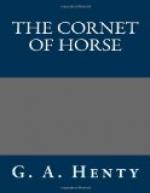The loss of the allies, considering the force that they brought into the field—for the main army had not arrived when the victory was decided—was extraordinary, for out of a total of 10,500 men, including cavalry, they lost 1500 killed, and 4000 wounded, or more than half their force; and the greater part of these were English, for upon them fell the whole brunt of the fighting.
The enemy suffered comparatively little in the battle, but great numbers were killed in the pursuit or drowned in the Danube. Still greater numbers of Bavarians scattered to their homes; and out of 12000 men, only 3000 joined the army on the other side of the Danube.
The Elector of Bavaria fell back with his army to Augsburg, under the cannon of which fortress he encamped, in a position too strong to be attacked. His strong places all fell into the hands of the allies; and every effort was made to induce him to break off from his alliance with France. The elector, however, relying upon the aid of Marshal Tallard, who was advancing with 45,000 men to his assistance, refused to listen to any terms; and the allied powers ordered Marlborough to harry his country, and so force him into submission by the misery of his subjects.
Such an order was most repugnant to the duke, who was one of the most humane of men, and who by the uniform kind treatment of his prisoners, not only did much to mitigate the horrors of the war in which he was engaged, but set an example which has since his time been followed by all civilized armies. He had, however, no resource but to obey orders; and the cavalry of the allies were sent to carry fire through Bavaria. No less than 300 towns and villages were destroyed in this barbarous warfare.
This duty was abhorrent to Rupert, who waited on the duke, and begged him as the greatest of favours to attach him for a short time to the staff, in order that he might not be obliged to accompany his regiment. The duke—who had already offered Rupert an appointment on his staff, an offer he had gratefully declined, as he preferred to do duty with his regiment—at once acceded to his request, and he was thus spared the horror of seeing the agony of the unhappy peasantry and townspeople, at the destruction of their houses. Rupert, in his rides with messages across the country, saw enough to make him heartsick at the distress into which the people of the country were plunged.
One day when riding, followed by Hugh, he came upon a sad group. By a hut which had recently been burned, after some resistance, as was shown by the dead body of a Hessian trooper, a peasant knelt by the body of his wife. A dead child of some five years old lay by, and a baby kicked and cried by the side of its mother. The peasant looked up with an air of bewildered grief, and on seeing the British uniform sprang to his feet, and with a fierce but despairing gesture placed himself as if to defend his children to the last.




